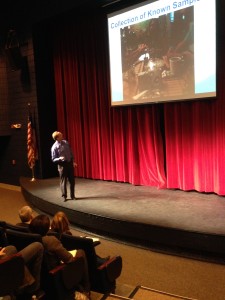Associate Professor Tim Palmbach, Chair of Forensic Science, presented advanced investigative and forensic tools that he personally used during his sabbatical work in order to facilitate the combat against the many exploited by the illegal trade of human trafficking. The presentation was held in Dodds Theater at the University of New Haven, Wed., January 29, from 5- 6 p.m.

Towards the beginning of the presentation, a video clip was shown of a bar where a typical scene of young girls being bought for prostitution was displayed. The conclusion of the clip resulted in the arrest of the man who bought the girl, ensuring the general population that there is a proactive movement towards the abolishment of human trafficking already in effect.
The audience soon found out that while the statistics within the clip were accurate, the actual arrest part was nothing but an illusion. As of 2013, an estimate of 29 million have been thrown into the world of human trafficking, and of those currently enslaved, there have been less than five successful convictions.
Last fall, Professor Palmbach had his sabbatical leave approved, and during so, travelled to a number of third world countries including: Nepal, Costa Rica, Djibouti, Croatia and Bosnia. to investigate how feasible forensic DNA analysis would be in actuality. After some form of government contact and a run-down of the areas they could possibly investigate, Palmbach, along with a small team of locals, entered the underground world of human trafficking.
They entered with limited video and audio equipment on them, as well as tiny cotton swabs, which they used to attain DNA samples. They collected DNA off of cigarettes, straws, glasses and condoms, and sometimes even directly ask them for a buccal sample.
Not once were Professor Palmbach and his team questioned for telling the subject that he was a researcher and needed to swab their mouth, and subjects complied easily. Once the samples swabs were collected, Professor Palmbach conducted a rapid DNA test, and after 84 minutes of waiting, a full 13-allele male/female DNA ladder was produced.
With this kind of technology, law enforcements are able to confirm the identities of the men who buy and have sexual intercourse with underaged girls. They will no longer have to depend solely on the testimony of the girls themselves in order to have more successful convictions. Palmbach has strong hopes that UNH will take part in the endeavors to combat human trafficking.
The Coalition to Combat Trafficking in Person is a Recognized Student Organization on campus through which students can learn more about the subject. UNH is also involved with the Starfish Project and partners with Prokid Negotiations, both which are currently proactive in rehabilitating children and women who suffer from enslavement and exploitation in rural areas.
With the many criminal justice and forensic science majors at UNH, and resources available to take part in this fight, this is an issue worth being involved in and taking the time to learn more about.















